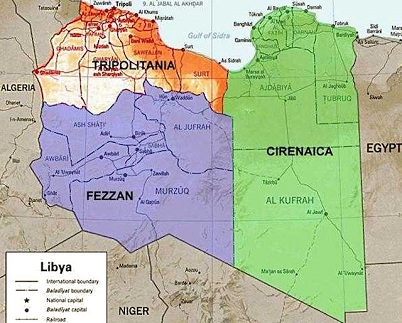Just a little over a week after Libya’s prime minister Ali Zaidan was sacked over the country’s deteriorating security situation, its newly appointed interim prime minister Abdullah al-Thinni has resigned after threats on his life and the lives of his family members. ![]()
In the United States and Europe, Libya long ago fell from the headlines, despite the support that NATO allies provided to the rebels that sought to oust Muammar Gaddafi in 2011.
But over three years after Gaddafi fell from power (he was captured during an attempt to escape his hometown of Sirte and brutally murdered by a mob), Libya is not in particularly good shape.
Oil production has allegedly fallen to just 12.5% of its Gaddafi-era levels, as the central government and regional militias play a game of tug-of-war over potential oil revenues. Meanwhile, the Libyan government is unable to guarantee security throughout much of the country, especially outside Tripoli.
Al-Thinni (pictured above), who formerly served as Libya’s defense minister, made it clear that he’s stepping down after an attempted attack on him and his family:
“My family and I suffered a brutal attack last night and shooting terrified local residents and put lives in danger,” Thinni said in a letter addressed to the [General National Congress] and published on the official Prime Ministry website. “I will not accept one drop of blood to be spilled because of me and I will not allow myself as Prime Minister to be a reason for Libyans fighting.”
Zaidan was forced out as prime minister in March (and subsequently fled the country) after an embarrassing episode, whereby rebels in Cyrenaica apparently loaded 234,000 barrels of crude oil onto a North Korea-flagged tanker, incongruously named the Morning Glory, managed to evade a national blockade and made it all the way to near Cyprus before US navy SEALS apprehended it.
It was the latest sign that Cyrenaica has every intention of evading Libya’s national infrastructure by selling crude oil directly to the world market. Ibrahim al-Jathran, a former rebel who long fought against Gaddafi, took control of Cyrenaica’s oil ports late last year, effectively shutting down most of the country’s oil production. He’s popular throughout the region, but he’s by no means the only leader vying for power there, and his militia is just one of many that control parts of Libya.
After Gaddafi’s fall, the residents of Cyrenaica hoped that Libya’s new government would recalibrate national spending to prioritize the rebuilding of Benghazi, Cyrenaica’s largest city, and otherwise allow greater regional autonomy. Although Libya ostensibly won independence in 1951, the country has traditionally been less a nation-state than a confederation of three distinct regions — Tripolitania in the northwest, Fezzan in the south and Cyrenaica in the east.

Though Cyrenaica holds between 60% and 80% of Libya’s oil, it’s home to just 1.6 million of Libya’s 5.7 million population. Without Cyrenaica’s oil, the rest of Libya would be an impoverished mess with little economic infrastructure and few governing institutions outside the capital, Tripoli. Without the rest of Libya, the relatively more conservative Cyrenaica could become a super-rich petrostate governed by shari’a law. As Musa al-Gharbi explained last week in The National Interest:
A decisive factor in the campaign against Gaddhafi was a large influx of mujahideen, many affiliated with Al Qaeda—many of whom hailed themselves from Eastern Libya, which had become a major source of transnational jihadists over the lifespan of the regime: Cyrenaica provided by far the most foreign fighters per capita to the insurgency in Iraq, just as the easterners had made a decisive contribution in the 1980s against the Russians in Afghanistan, with many ascending to pivotal roles in Al Qaeda’s central leadership over the successive decades.
Most of these fighters pledged their allegiance to the NTC in the aftermath of the revolution, exclusively under the condition their conservative interpretations of Islamic law would be written into Libya’s constitution and serve as the foundation of Libyan law. However, as the Western-backed interim government came into increasing conflict with some of these Islamist factions, many militias in turn denied the legitimacy of the central authorities and joined Eastern separatist movements under the loose command of former rebel-leader Ibrahim Jathran. In October of 2013, these forces seized the oilfields that PM Zeidan had assigned them to protect on behalf of the NTC, now controlling three of Libya’s largest fields and working on a fourth.
It’s not just Cyrenaica, however, that’s becoming increasingly disenchanted with the GNC and Libya’s transitional government, which has been dominated by the secular, liberal National Forces Alliance (تحالف القوى الوطنية) and the Justice and Construction Party (حزب العدالة والبناء), the Muslim Brotherhood’s political arm.
Earlier this year, under increasing pressure that the interim GNC government should disband (its mandate expired on February 7), its president announced that Libya would hold parliamentary elections ‘as soon as possible’ — maybe in July, though no one knows exactly when those elections might be. Elections earlier in February to choose the constituent assembly that will be tasked with writing Libya’s constitution were essentially a disaster — only 14% of eligible voters bothered to cast a vote, and in some areas, results haven’t been announced because of election violence, apathy or basic concerns about fraud.
Zaidan, a liberal who served abroad as the rebels’ chief envoy to Europe during the civil war to oust Gadaffi, became prime minister in November 2012 only after the first choice, Mustafa Abu Shagur, failed twice to win parliamentary support for his government. Zaidan’s government always faced long odds. In addition to the ongoing security and basic governance failures of Libya’s weak central state, the division between secular liberals and Islamists within the GNC has stymied the progress of Libya’s transition in the post-Gaddafi era. Zaidan himself was captured for a few hours in October 2013 in an ill-fated attempt to launch a coup d’état.
